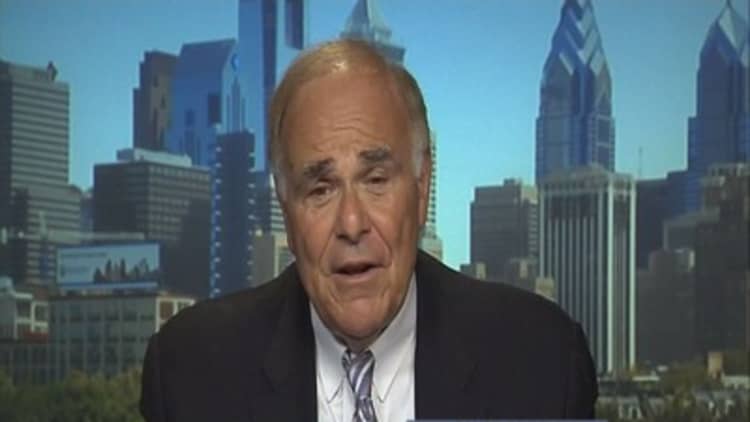
This Fourth of July weekend, former Pennsylvania Gov. Ed Rendell is calling on the nation to "invest in our own future" by fixing highways, bridges, rails and airports across America.
Rendell, an avowed believer in infrastructure spending, renewed his call for the federal government to plow more public money into the U.S.'s aging transportation architecture.
"Infrastructure made this country great," Rendell says in an interview with CNBC's "On The Money."
The Keystone State's former governor is blaming Washington for inaction in refusing to fund the projects that could rebuild U.S. infrastructure. As a percentage of gross domestic product, public funding of the sector has fallen sharply, even when factoring in the effects of the 2009 stimulus package.
"Washington is paralyzed," he told CNBC in an interview. "They can't raise their hand and invest revenue in anything, even things that are important to our quality of life, our public safety, our economic competitiveness and job creation."
Read MoreFuel is cheaper, so let's hike gas tax: Former governor
Dig baby, dig!
We’ve got to get some structural changes in the way we fund transportation infrastructure, period.Ed Rendellformer Pennsylvania governor
Rendell, who co-chairs "Building America's Future," a bipartisan group focused on improving infrastructure, says politicians are always calling for job creation. Still, he said, "nothing will create better, middle-class, high-paying jobs than investing in our infrastructure."
Yet critics of infrastructure spending point to the failure of the 2009 stimulus bill to create so-called "shovel ready" jobs, which even President Barack Obama eventually acknowledged weren't as ready as early rosy predictions believed.
A study by Stanford University economist John Taylor found that out of nearly $700 billion, actual infrastructure spending comprised less than four-tenths of a percent.
For his part, Rendell said that as a country, "we've stopped investing in ourselves. We've stopped doing big and bold things."
He cites fast trains as an example. "Japan and Europe have high-speed rail that goes over 220 miles per hour." He says "our fastest rail system" is Amtrak's Acela from Boston to Washington, which only averages 84 miles per hour.
Read MoreAmerica is in an infrastructure crisis: Ray LaHood
"Sixty years ago, there was a train that averaged 70 miles an hour," Rendell said. "We've made virtually no progress."
Rendell says the Northeast corridor needs a dedicated rail line, because the Acela travels on the same rails used by freight and commuter trains.
"We need a straight, dedicated rail line. We can build it. We can do it. And it will pay for itself over the long run," he said.
US plagued by mediocre roads
On America's four million miles of highway, 32 percent of the nation's major roads are in poor or mediocre condition, according to a 2013 American Society of Civil Engineers report.
Meanwhile, the Federal Highway Trust fund, which provides one-quarter of the money spent on public roads, is on track to be insolvent by September. At the same time, the federal gas tax, the fund's primary method of funding, has remained at 18.4 cents a gallon for the past 22 years.
Rendell is among those who believes the tax should be hiked. "The Chamber of Commerce and the AFL-CIO have all endorsed raising the gas tax." Rendell told CNBC. "Those are two organizations who couldn't agree on what day of the week it is. And yet they both come out strongly in favor of raising the gas tax."
Rendell added that 14 states have raised their own gas tax "out of frustration waiting for the federal government. We need a long-term structural fix."
He called for private sector involvement, but stressed that the federal government needed to "get away from the reluctance to raise revenue for anything."
Rendell also suggested bringing back "Build America Bonds"—taxable municipal bonds that he says worked well during Obama's stimulus, or by creating an infrastructure bank similar to some of those in Europe.
"We've got to get some structural changes in the way we fund transportation infrastructure period," he said.



